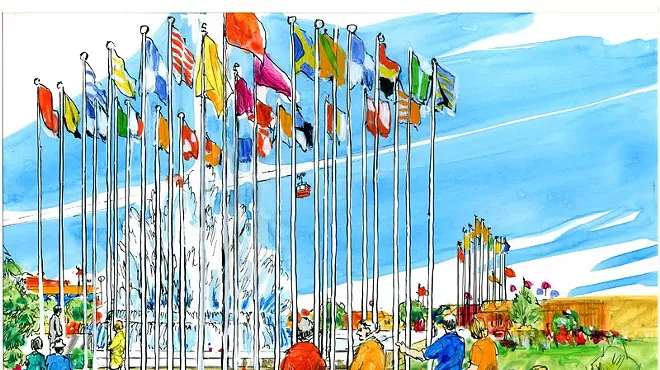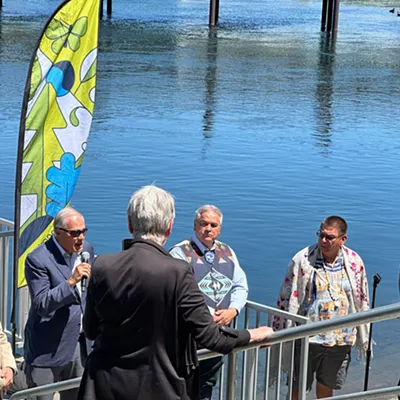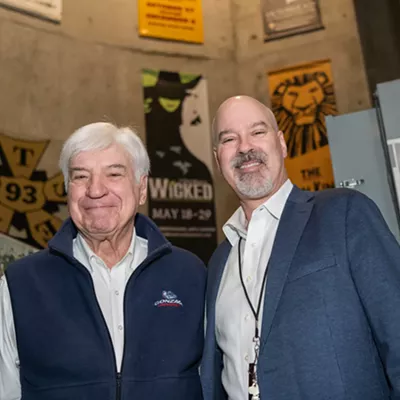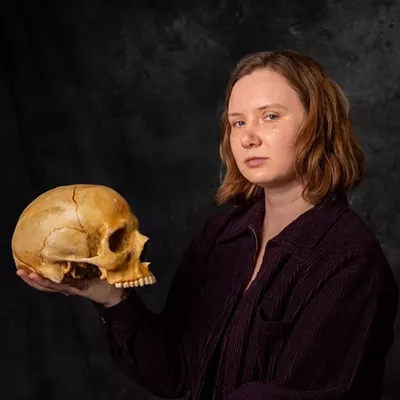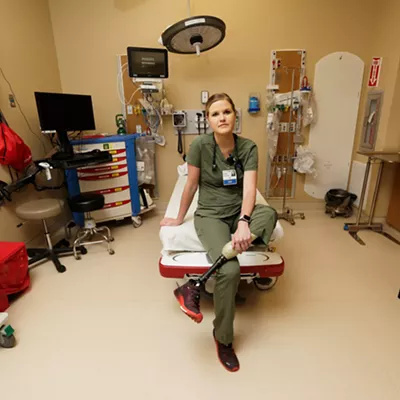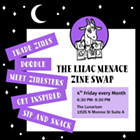
The region's Native American community came out in force during Expo '74, resulting in one of the event's most popular attractions. However, according to Spokane tribal member Margo Hill, their official involvement was largely an "afterthought," a sentiment that was captured in The Fair and the Falls, Bill Youngs' historical account of the world's fair in Spokane.
Hill was just 6 years old when Expo '74 took place. Now interim director of American Indian Studies and associate professor of Urban and Regional Planning at Eastern Washington University, she recalls the way that the indigenous community viewed the event, the activities they hosted and a few of the less-talked-about aspects of the fair — including some run-ins with nearby loggers.
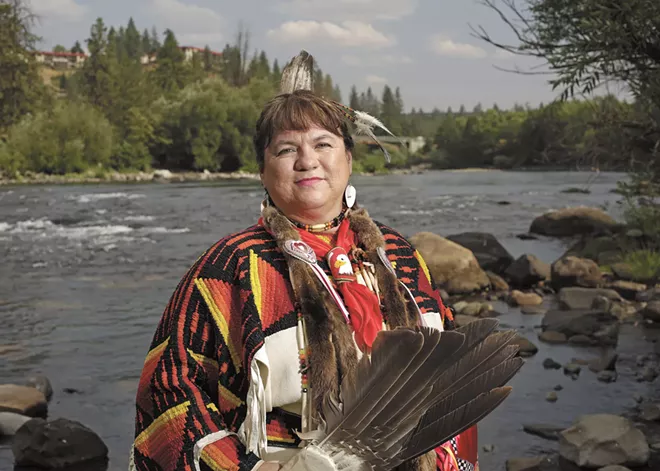
INLANDER: When the Indigenous community was finally invited to participate, was that offer viewed with skepticism, or was there a sense that this would be an opportunity to increase tribal visibility and authentically share your culture with others?
MARGO HILL: On our part, it was genuine. Once our tribes were involved, we took it really seriously that we could educate our neighbors and return to the city. Originally, you know, from the time I was growing up and even as far back as [the days of] horse and buggy, there was very much a dusk-till-dawn expectation that people of color — Natives — couldn't be in the city. I can remember being little and going to restaurants and White people staring at us. It was almost like a spectacle to see Brown people in the city. We just weren't welcome.
So the Spokane Tribe was very, very interested in coming back into the city and not only sharing our culture but doing our ceremonies in our homelands. To be on our riverbanks and to sing our songs and to do our dances and perform our ceremonies — to have that again was really important.
So participating in Expo '74 was a bit like a reclamation or a homecoming?
Yes, very much so. All the tribes felt that. It was an opportunity for us to come back into the city and educate non-Indians and share our culture. There were times that the Coeur d'Alene came in and danced. There were Makah that came over from the coast. At the opening ceremonies, there were two Quinault dugout canoes there. And then also Joe Washington and his family came and sang some of the coastal [tribal] songs. We had excellent representation at the world's fair. And people loved coming to watch the tribal dances and songs and ceremonies. We even had a mock wedding. Gib[son] Eli, one of our medicine man spiritual leaders, did a symbolic wedding between Carol Evans and Mike Seyler. We were one of the most well-attended attractions.
Clearly, many local and regional tribes participated, and you could say there was a shared experience among the Indigenous community. What are some of your personal memories from that time?
For me as a 6-year-old, it was the unity of the local tribes and a belonging for our people as we joined the circle. My family was very involved. My great-grandmother, Sadie Boyd, told the history. And then my grandmother was interpreting from the Salish language. Of course, my great-grandmother could speak English, but when it came to some historical things, she wanted to speak in her native language and have my grandmother interpret for her. My great grandmother also said that she was very glad that President Nixon visited the opening of Expo. She helped line up the dancers and really helped get folks ready for the war dance and ceremony.
But every day we had our powwow pavilion where we had different aspects of our culture. And we had another grandmother, Etta Adams, who was the whip woman. The family called her "Big Mom," and she had a stick with a horse tail on the front of it. She made sure that we children didn't horse around on the dance floor [and] that we weren't running around or chewing bubble gum.
In a recent update to The Fair and the Falls, you shared the frustrating experience of being stationed right next to the loggers during Expo '74.
Yeah, unfortunately, somebody thought it was a good idea to put the loggers right next to us. My great-grandmother or somebody would be telling our history or praying, and they would fire up their chainsaws. And so there was lots of confrontation. We'd have to scream at them [over the noise] to shut it down. I don't know that they were doing it intentionally, but if you have a tribal elder that's telling a history or a story, you need to be respectful of that.
A few months back, when Bill Youngs contacted me, I e-mailed him that story. He's included it in the new foreword to his book. Because there's a lot of aspects of the fair that people don't talk about, right?
What are some of those other unspoken aspects?
Well, if you look at social justice issues [around Expo '74], the other thing is that we wiped out Chinatown. There was a significant Asian population, and we just moved them out to make room for construction projects. So, you know, here they are, trying to maybe redress some of these historical injustices by reaching out to the Indigenous community, even though it was kind of an afterthought, and yet here you have Chinatown [known as Trent Alley] eradicated for Expo.
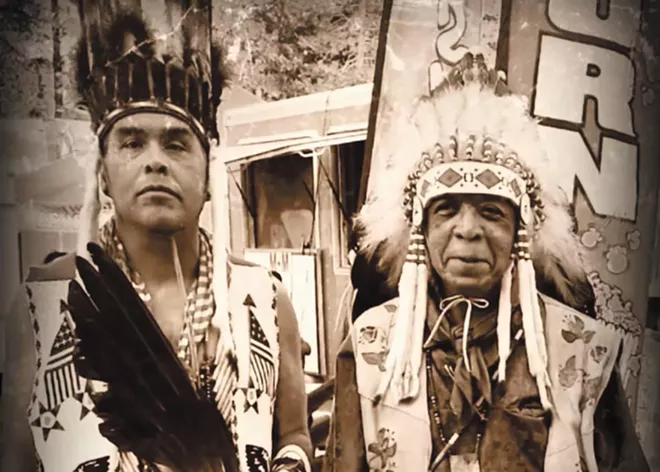
The environmental theme of Expo '74 seems like it would tie into Indigenous culture and priorities. Was there excitement around that?
Each of our [Spokane tribal] bands are named in relationship to the river: the Upper, Snttúlix, the Middle, Snxmeney, and the Lower, Scqescini. The Spokane River was Nx Wl Wl tsuten, which is like our way of life. For thousands of years, we had gathered on its banks to fish. A hundred natives would swell to 300. Fifteen thousand pounds of salmon would be drying on the banks of the Spokane River. Our salmon got to the size of 80 pounds. My grandmother would talk about when a salmon would hang from a saddle horn of a horse. It would almost touch the ground.
But the hydropower projects had been devastating to our communities. And then we saw this constant contamination. For decades, our tribal people watched the degradation of the Spokane River. We saw the pollution — you know, municipal waste and sewage going right into the water.
So to hear the non-native say, "Oh, it's going to be an environmentally themed expo, and we're going to clean up the river," we were ecstatic to hear that because it had been a long time coming. You know, there's a famous quote [in The Fair and the Falls] from [Spokane tribal Chief] Alex Sherwood, who said, "River Spirit, you fed our people. You answered our call. I walk your banks and I shout, 'River, do you remember?'" He was essentially asking the spirit to remember the way things used to be. And so, for Expo '74 to finally to clean up the city and the riverbanks and stop polluting, that was all really important. And given the timing, with the passage of NEPA [the National Environmental Policy Act] and the Clean Water Act and the Clean Air Act, the world's fair was seen as the culmination of a lot of things.
Fifty years on, issues of environmental and social justice persist, but one area of progress is that the tribal pillar has been integral to the event planning. What are some of the ways that tribes are participating in these anniversary celebrations?
On our committee, we have all the different tribes: Spokane, Colville, Kalispel, Coeur d'Alene and Kootenai, but also Blackfeet, Turtle Mountain Chippewa and Gros Ventre. And we're all working together behind the scenes to make this happen. We have a whole range of events. Warren Seyler, who is a former Spokane tribal chairman, is going to be sharing some of the history. We'll have traditional songs with a hand drum. There's spoken word events where we're going to be having indigenous poetry and native authors. We're going to be bringing over a theater company from Seattle called Red Eagle Soaring. We're even going to have a Native American music festival and a fashion show. And what this does is it gives tribal people an opportunity to showcase our talents, which is just super exciting. There's so much talent in Indian country that you don't see in Spokane. We want our neighbors to come and learn and really experience tribal culture. It's a great opportunity for tribal members as well as city residents here in Spokane. ♦
Learn more about all Expo 50 events, which run through July 4, at Expo50Spokane.com



